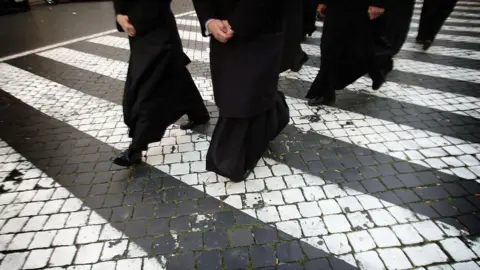— Gay conversion therapy in Italy

By Davide Ghiglione
Rosario Lonegro was only 20 years old when he entered a Catholic seminary in Sicily as an aspiring priest preparing to be ordained. But while he was there he fell in love with another man and his superiors demanded that he undergo conversion therapy intended to erase his sexual preferences if he wanted to continue on the path to the priesthood.
“It was the darkest period of my life,” he told the BBC, recalling his seminary experience in 2017.
Haunted by guilt and fears of committing a sin in the eyes of the Catholic Church, Rosario said he “felt trapped with no choice but to suppress my true self”.
“The psychological pressure to be someone I was not was insurmountable. I could not change no matter how hard I tried.”
For more than a year, he was compelled to take part in spiritual gatherings outside the seminary, some over several days, where he was subjected to a series of distressing activities intended to strip him of his sexual proclivities.
These included being locked in a dark closet, being coerced to strip naked in front of fellow participants, and even being required to enact his own funeral.
During these rituals, he was tasked with committing to paper his perceived flaws, such as “homosexuality”, “abomination”, “falsehood” – and even more explicit terms, which he was then obliged to bury beneath a symbolic gravestone.
‘I thought I needed to be cured’
The World Health Organization (WHO) removed homosexuality from its list of mental disorders in 1990. Subsequent scientific research has largely concluded that attempts to change sexual orientation are not only ineffective but also harmful.
In France, Germany and predominantly Catholic Spain, conversion therapies have been officially banned, and efforts are under way both in England and Wales to outlaw such practices.
Today in Italy, it’s nearly impossible to determine the precise extent of these practices, reported mostly by men, but some women too, and there is no standard legal definition of them.
In recent months, however, the BBC has conducted interviews with several young gay men across the country who have shared their experiences of being subjected to pseudoscientific group meetings or individual therapy sessions aimed at turning them into heterosexuals.
One 33-year-old man who attended this type of meeting for over two years expressed his initial motivation, saying: “I wanted to reconcile with myself. I didn’t want to be homosexual. I thought I needed to be cured.”
“I saw that as my sole path to acceptance,” said another. He was not trying to become a priest, but was simply seeking acceptance in his daily life.

Gay conversion therapy is not limited to one specific region of Italy – group meetings and individual therapy sessions run across the country, some even run by licensed psychotherapists. In some cases, these gatherings and therapy sessions are unofficial and covert, often promoted through discreet conversations and secret referrals.
Other courses are publicly advertised, with known figures within Italy’s conservative circles actively seeking followers online and on social media platforms to promote their ability to change sexual orientations.
In Sicily, Rosario Lonegro was primarily subjected to meetings organised by the Spanish group Verdad y Libertad (Truth and Freedom), under the leadership of Miguel Ángel Sánchez Cordón. This group has since disbanded, having incurred the disapproval of the Catholic Church.
However, the Italian priest who originally pushed Lonegro into these practices was given a senior position within the Church, while others continued to draw inspiration from Sánchez Cordón’s methods in Italy.
Many of the people the BBC spoke to were referred to Luca di Tolve, a “moral/spiritual trainer” who gained recognition through his book titled “I was gay once. In Medjugorie I found myself”.
On his website, Di Tolve and his wife boast that they are a “contented couple” seeking to “aid anyone whose sexual identity is in turmoil, helping them to genuinely exercise their freedom in determining who they wish to be as a person”. When contacted by the BBC, Di Tolve did not respond.
Another active individual promoting ways to tackle perceived sexual orientation is Giorgio Ponte, a well-known writer in Italy’s ultra-conservative circles. He says he wants to help people overcome their homosexuality and be liberated, by telling his own story as a man with homosexual drives who is on his “potentially life-long” path to freedom.
“In my experience, homosexual attraction stems from an injury to one’s identity that conceals needs unrelated to the sexual-erotic aspect but rather tied to a distorted perception of oneself, reflecting across all aspects of life,” he told the BBC.
“I believe that a homosexual person should have the freedom to try [to become heterosexual], if they want, knowing, however, that it may not be possible for everyone,” he added.
‘When I kissed her it felt unnatural’
In recent years, dozens of young men and women have sought guidance from the likes of Di Tolve, Ponte and Sánchez Cordón. Among them is 36-year-old Massimiliano Felicetti, a gay man who grappled with attempts to change his sexual orientation for more than 15 years.
“I started to be uncomfortable with myself from a very early age, I felt I would never be accepted by my family, society, Church circles. I thought I was wrong, I just wanted to be loved, and these people offered me hope,” he said.
Felicetti said he had tried different solutions, consulting psychologists and clergy members who offered to help him become heterosexual. However, about two years ago, he decided to stop. A friar who knew of his struggle encouraged him to start dating a woman, but it didn’t feel natural.
“When I kissed her for the first time, it felt unnatural. It was time to stop pretending,” Felicetti said.
Only a few months ago he came out as gay to his family. “It took years, but for the first time I am happy to be who I am.”
Despite attempts from previous governments to promote a bill to oppose conversion therapies, no progress has been made in Italy. Italy’s right-wing government led by Giorgia Meloni has so far adopted a hostile stance toward LGBT rights, with the prime minister herself vowing to tackle the so-called “LGBT lobby” and “gender ideology”.
Such lack of progress comes as no surprise to Michele Di Bari, a researcher in comparative public law at the University of Padova, who says that Italy is structurally much slower to implement change compared with other countries in Western Europe.
“This is a very elusive phenomenon, given that it is a practice prohibited by Italy’s order of psychologists itself. Yet, in the Italian legal system, it is not deemed illegal. People carrying out such practices can’t be punished.”
Despite the complexity of the issue, experts believe that partly due to Italy’s strong Catholic influence, the country has been more hesitant to prohibit these controversial practices.

“This may be one of the elements that, along with a strongly patriarchal and male chauvinist culture, makes the broader understanding of homosexuality and LGBT rights more difficult,” said Valentina Gentile, a sociologist at Rome’s LUISS University.
“However, it is also fair to say that not all Catholicism is hostile to the inclusion of diversity and the Church itself is in a period of strong transformation in this regard,” she added.
Pope Francis has said that the Catholic Church is open to everyone, including the gay community, and that it has a duty to accompany them on a personal path of spirituality, but within the framework of its rules.
However, the Pope himself was reported to have used a highly derogatory term towards the LGBT community when he told a closed-door meeting with Italian bishops that gay people should not be allowed to become priests. The Vatican issued an official apology.
Rosario Lonegro has left Sicily behind and also lives in Milan. Following a nervous breakdown in 2018, he left both the seminary and the conversion therapy group.
While he still believes in God, he no longer wants to become a priest. He shares an apartment with his boyfriend, he studies philosophy and undertakes occasional freelance work to pay for university. However, the psychological wounds inflicted by such activities still run deep.
“During those meetings, one mantra haunted me and was repeated over and over: ‘God didn’t make me that way. God didn’t make me homosexual. It’s only a lie I tell myself,’ I thought I was evil,” he said.
“I will never forget that.”
Complete Article ↪HERE↩!

